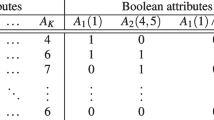Abstract
In this paper we describe the concept of Meta ARM in the context of its objectives and challenges and go on to describe and analyse a number of potential solutions. Meta ARM is defined as the process of combining the results of a number of individually obtained Associate Rule Mining (ARM) operations to produce a composite result. The typical scenario where this is desirable is in multi-agent data mining where individual agents wish to preserve the security and privacy of their raw data but are prepared to share data mining results. Four Meta ARM algorithms are described: a Brute Force approach, an Apriori approach and two hybrid techniques. A “bench mark” system is also described to allow for appropriate comparison. A complete analysis of the algorithms is included that considers the effect of: the number of data sources, the number of records in the data sets and the number of attributes represented.
Access this chapter
Tax calculation will be finalised at checkout
Purchases are for personal use only
Preview
Unable to display preview. Download preview PDF.
Similar content being viewed by others
Reference
Agrawal, R. and Psaila, G. (1995). Active Data Mining. Proc. 1st Int. Conf. Knowledge Discovery in Data Mining, AAAI, pp 3-8.
Agrawal, R., Mehta, M., Shafer, J., Srikant, R., Arning, A. and Bollinger, T. (1996). The Quest Data Mining System. Proc. 2nd Int. Conf. Knowledge Discovery and Data Mining, (KDD1996).
Aref, W.G., Elfeky, M.G., Elmagarmid, A.K. (2004). Incremental, Online, and Merge Mining of Partial Periodic Patterns in Time-Series Databases. IEEE Transaction in Knowledge and Data Engineering, Vol 16, No 3, pp.332-342
Coenen, F.P. Leng, P., and Goulbourne, G. (2004). Tree Structures for Mining Association Rules. Journal of Data Mining and Knowledge Discovery, Vol 8, No 1, pp25-51.
Dietterich, T.G. (2002). Ensemble Methods in Machine Learning. In Kittler J. and Roli, F. (Ed.), First International Workshop on Multiple Classifier Systems, LNCS pp1-15 Research and Development in Intelligent Systems XXIV 151
Goulbourne, G., Coenen, F.P. and Leng, P. (1999). Algorithms for Computing Association Rules Using A Partial-Support Tree. Proc. ES99, Springer, London, pp132-147.
Han,J., Pei, J. and Yiwen, Y. (2000).Mining Frequent Patterns Without Candidate Generation. Proc. ACM-SIGMOD International Conference on Management of Data, ACM Press, pp1-12.
Koh, J.L. and Shieh, S.F. (2004). An efficient approach to maintaining association rules based on adjusting FP-tree structures. Proc. DASFAA 2004, pp417-424.
Leung, C.K-S., Khan, Q.I, and Hoque, T, (2005). CanTree: A tree structure for efficient incremental mining of Frequent Patterns. Proc. ICDM 2005. pp274-281.
Li W., Han, J. and Pei, J. (2001). CMAR: Accurate and Efficient Classification Based on Multiple Class-Association Rules. Proc. ICDM 2001, pp369-376.
Li, X., Deng, Z-H. and Tang S-W. (2006). A Fast Algorithm for Maintenance of Association Rules in Incremental Databases. Proc. ADMA 2006, Springer-Verlag LNAI 4093, pp 56-63.
Liu, B. Hsu, W. and Ma, Y (1998). Integrating Classification and Association Rule Mining. Proc. KDD-98, New York, 27-31 August. AAAI. pp80-86.
Prodromides, A., Chan, P. and Stolfo, S. (2000). Meta-Learning in Distributed Data Mining Systems: Issues and Approaches. In Kargupta, H. and Chan, P. (Eds), Advances in Distributed and Parallel Knowledge Discovery. AAAI Press/The MIT Press, 2000, pp81-114.
Thomas, S., Bodagala, S., Alsabti, K. and Ranka, S. (1997). An efficient algorithm for the incremental updation of association rules. In Proc. 3rd ACM SIGKDD Int. Conf. on Knowledge Discovery and Data Mining. pp263-266.
Veloso, A.A., Meira, W., de Carvalho B. Possas, M.B., Parthasarathy, S. and Zaki, M.J. (2002). Mining Frequent Itemsets in Evolving Databases. Proc. Second SIAM International Conference on Data Mining (SDM’2002).
Author information
Authors and Affiliations
Editor information
Editors and Affiliations
Rights and permissions
Copyright information
© 2008 Springer-Verlag London Limited
About this paper
Cite this paper
Albashiri, K.A., Coenen, F., Sanderson, R., Leng, P. (2008). Frequent Set Meta Mining: Towards Multi-Agent Data Mining. In: Bramer, M., Coenen, F., Petridis, M. (eds) Research and Development in Intelligent Systems XXIV. SGAI 2007. Springer, London. https://doi.org/10.1007/978-1-84800-094-0_11
Download citation
DOI: https://doi.org/10.1007/978-1-84800-094-0_11
Publisher Name: Springer, London
Print ISBN: 978-1-84800-093-3
Online ISBN: 978-1-84800-094-0
eBook Packages: Computer ScienceComputer Science (R0)




